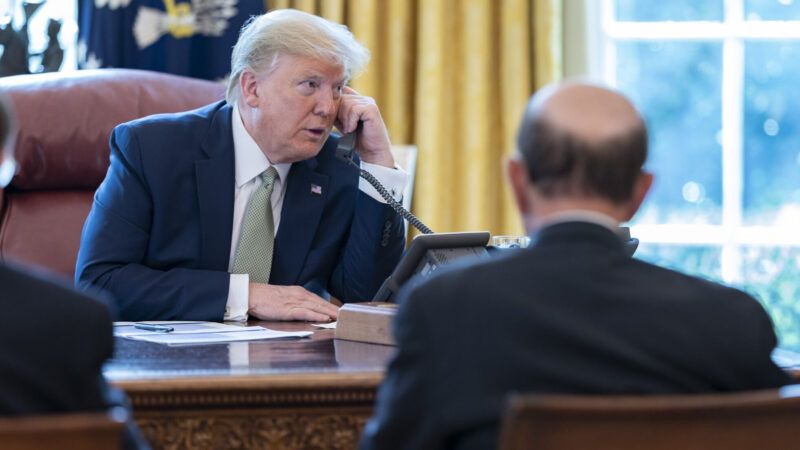Trump Never Told Georgia's Lead Election Investigator To 'Find the Fraud'
He said plenty of other bad things. But more than one quote sourced to anonymous informants has turned out to be wrong.

One of the most damning indictments of President Donald Trump's behavior in the immediate aftermath of the 2020 presidential election was that he allegedly pressured Georgia's lead elections investigator to "find the fraud." The Washington Post first reported this detail on January 9, and countless other mainstream media sites publicized it.
But that reporting was wrong. Trump never used the phrase "find the fraud" during his December phone call with Frances Watson, the chief investigator within the secretary of state's office; moreover, he never promised Watson that she would be a "national hero" if she did discover evidence of fraud.
The Post's article relied on testimony from an anonymous source, since it was believed that no recording of the phone call existed. But Watson discovered an audio file during an effort to retrieve documents for a public records request. This file, which was published last week by The Wall Street Journal, makes clear that the quotes supplied by the anonymous source were erroneous.
During the call, Trump told Watson that she had "the most important job in the country" and that she would be praised "when the right answer comes out." He also made several incorrect statements, and continuously asserted that he had actually won the state of Georgia.
"I won Georgia, I know that, by a lot, and the people know it," said Trump. "Something happened. Something bad happened."
Trump deserves criticism for repeatedly and loudly making this false claim, which eventually culminated in some of this more rabid and deluded supporters assaulting the U.S. Capitol. But the notion that he pressured Watson to specifically uncover evidence of fraud looks much weaker now that a recording of the call has been released.
Trump's other call with Georgian election officials, a transcript of which has been available for months, continues to look quite bad for him: He repeatedly stated an exact number of votes that he would like the investigators to discover. It would not be wrong to conclude that Trump inappropriately exerted pressure on Georgian election officials. But he did not say precisely what the media alleged that he had said, and that matters.
It matters because many White House reporters have increasingly come to rely upon anonymous reporting. The public needs to have confidence that when The Washington Post, The New York Times, CNN, NPR, etc., supply information from a confidential source, that information is accurate. When a source's name is used in an article, readers can place a greater degree of trust in the information—since that person has put his or her reputation on the line—but an anonymous source is shielded from criticism, putting the onus on the journalist to get it right. That clearly didn't happen here.
At a time when the public's trust in traditional media has hit an all-time low, screw-ups like this one certainly don't help.


Show Comments (282)